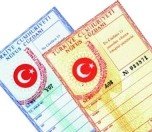Click to read the article in Turkish
Lawyer Turgut Kazan, the former chairperson of the İstanbul Bar, brought the decision of the Supreme Election Council (YSK) that President Recep Tayyip Erdoğan can run once again for the presidency, to the European Court of Human Rights (ECtHR).
Kazan had submitted a petition to YSK, objecting to Erdoğan's candidacy, and upon rejection of his application and approval of the candidacy, he applied to the ECtHR.
Kazan had said in his petition, "The rule of limitation for the number of terms of presidency which is stated in the Constitution, is binding for all bodies, posts, authorities, and people including the YSK. It is not in any way acceptable, that with interpretations such as saying Turkey has changed the system with the 2017 amendment and a single-man regime was founded, therefore the 2018 election was the first election of the new system, and the 2023 elections will be the second," Mezopotamya Agency reported.
"YSK accepted non-stamped ballots in 2017 referendum"
Kazan also wrote on his social media and reminded all that YSK had considered valid 2,5 million non-stamped ballots in the 2017 referendum. He added, "Whereas, articles 77 and 101 of the Law No. 298 were very clear. The ballots which did not have the stamp of the related ballot box could not be counted as valid. However, a sloppy petition by the Justice and Development Party (AKP) representative was taken into account and the transition to the single-man regime was enabled."
Kazan stated that article 101/2 of the Constitution stating that a person can be elected the President two times at most was disregarded with the latest decision by YSK.
2017 referendum
A constitutional referendum was held in Turkey on 16 April 2017 on whether to approve 18 proposed amendments to the Constitution that were brought forward by the governing Justice and Development Party (AKP) and the Nationalist Movement Party (MHP). As a result of its approval, the office of the Prime Minister was abolished and the existing parliamentary system of government was replaced with an executive presidency and a presidential system. The number of seats in Parliament was raised from 550 to 600, while, among a series of other proposals, the president was given more control over appointments to the Supreme Board of Judges and Prosecutors (HSYK). The referendum was held under a state of emergency that was declared following a failed military coup attempt in July 2016.
Early results indicated a 51–49% lead for the "Yes" vote. In an unprecedented move, the Supreme Electoral Council (YSK) allowed non-stamped ballots to be accepted as valid. Some critics of the reform decried this move to be illegal, claiming that as many as 1.5 million ballots were unstamped, and did not recognize the results. Large-scale protests erupted following the results in order to protest the YSK's decision. In subsequent reports, the Organization for Security and Co-operation in Europe (OSCE) and the Parliamentary Assembly of the Council of Europe (PACE) both criticized unfairness during the campaign and declared the YSK's decision to be illegal. (Source: Wikipedia)
(RT/PE)




.jpg)



